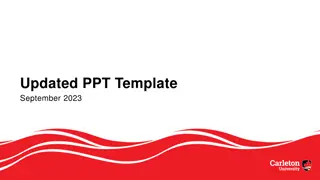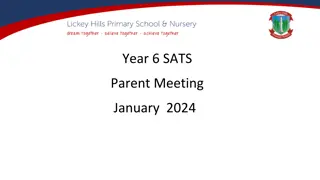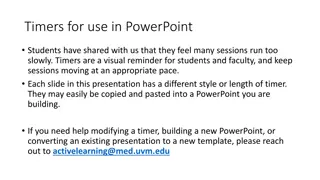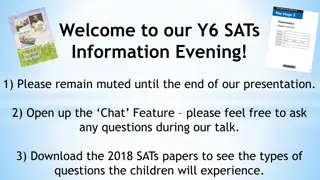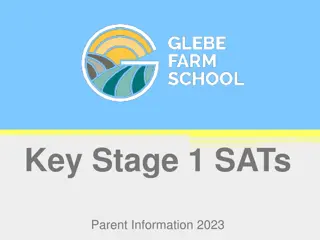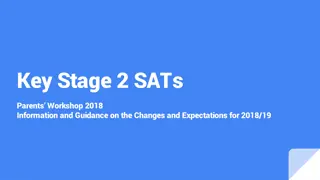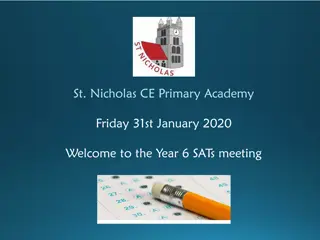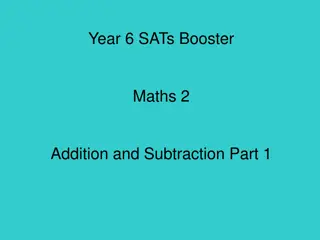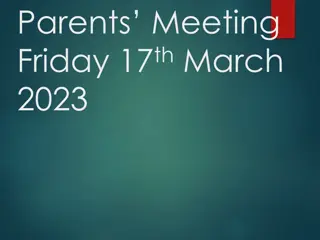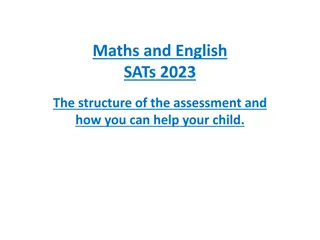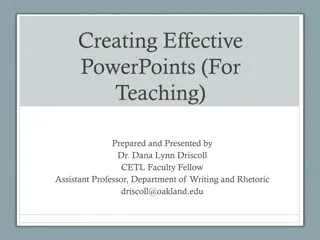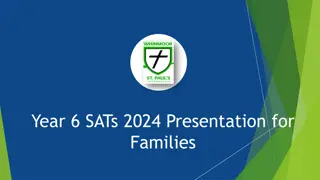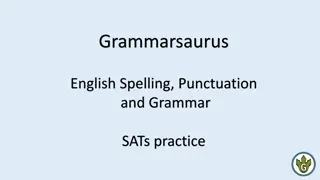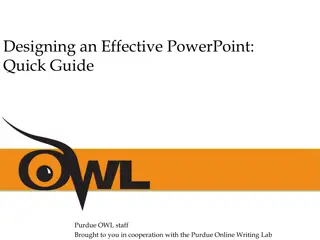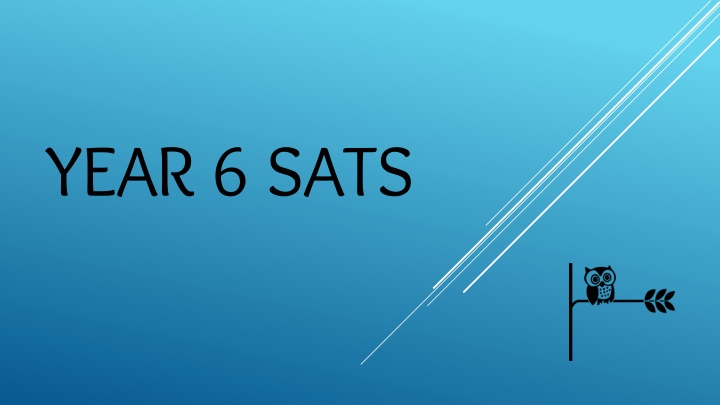
Year 6 SATs Assessments and Timetable
Discover how Year 6 students are assessed through teacher assessments and SATs tests in the UK, including details on SATs subjects, test timings, and sample questions. Get insights into Grammar, Punctuation, and Spelling (GPS) tests, reading assessments, and more.
Download Presentation

Please find below an Image/Link to download the presentation.
The content on the website is provided AS IS for your information and personal use only. It may not be sold, licensed, or shared on other websites without obtaining consent from the author. If you encounter any issues during the download, it is possible that the publisher has removed the file from their server.
You are allowed to download the files provided on this website for personal or commercial use, subject to the condition that they are used lawfully. All files are the property of their respective owners.
The content on the website is provided AS IS for your information and personal use only. It may not be sold, licensed, or shared on other websites without obtaining consent from the author.
E N D
Presentation Transcript
Introductions Miss Beech, Miss Williams, and Mrs Gibson
How are the children assessed? There are two sorts of assessments: A) Teacher assessments B) SATs Tests What does teacher assessment involve and is it different from testing? Teacher assessment draws together everything the teacher or teachers know about a child, including normal class lessons, observations, marked work and school assessments. Teacher will assess reading, writing, maths and science in this way.
What are the SATs? SATs are reading, maths and GPS (Grammar, punctuation and spelling) tests that are completed in May each year for Year 6 children across England. All children sit the same tests they have removed the additional Level 6 papers that some children would have been entered for and had to sit during the afternoons of SATs week
Date Test Timings Timetable SpaG - English grammar, punctuation and spelling test, Paper 1 (short answer questions ) Monday 13th May 45 minutes SpaG - English grammar, punctuation and spelling test, Paper 2, spelling 20 minutes Tuesday 14th May English reading test 60 minutes Wednesday 15th May Mathematics, Paper 1, arithmetic test Mathematics, Paper 2, reasoning 30 minutes 40 minutes Thursday 16th May Mathematics, Paper 3, reasoning 40 minutes
GPS (Grammar, punctuation and spelling) This will consist of two parts: 1. Grammar and punctuation paper requiring short answers, lasting 45 minutes 2. Oral spelling test of 20 words, lasting around 15 minutes. The grammar and punctuation test will include two sub-types of questions: Selected response, e.g. Identify the adjectives in the sentence below Constructed response, e.g. Correct/complete/rewrite the sentence below, or, The sentence below has an apostrophe missing. Explain why it needs an apostrophe.
Sample Questions - GPS Grammar, Punctuation and Spelling Paper 1
Reading The reading test will be a single paper with questions based on three passages of text. Your child will have one hour, including reading time, to complete the test. There will be a selection of question types, including: Ranking/ordering, e.g. Number the events below to show the order in which they happen in the story Labelling, e.g. Label the text to show the title of the story Find and copy, e.g. Find and copy one word that suggests what the weather is like in the story Short constructed response, e.g. What does the bear eat? Open-ended response, e.g. Look at the sentence that begins Once upon a time. How does the writer increase the tension throughout this paragraph? Explain fully, referring to the text in your answer.
Maths Children will sit three papers in maths: Paper 1: Arithmetic, 30 minutes Papers 2 and 3: Reasoning, 40 minutes per paper Paper 1 will consist of fixed response questions, where children have to give the correct answer to calculations, including long multiplication, division, fractions and percentages. Papers 2 and 3 will involve a number of question types, including: Multiple choice True or false Constrained questions, e.g. giving the answer to a calculation, drawing a shape or completing a table or chart Less constrained questions, where children will have to explain their approach for solving a problem
Sample Questions Maths Paper 1: Arithmetic
Sample Questions Maths Paper 2 / Paper 3 : Reasoning
How we carry out the SATs We acknowledge that this can be an anxious time for Year 6 so we have been helping them to prepare for these tests for some time so that they are familiar with the format, structure and layout. The staff have worked especially hard to try and ensure that the children are relaxed and able to do their best which, is all we ask of them. Children will be split into groups to do the tests, so they are not all in one big hall as this can be daunting. The staff organise this well in advance taking account of friendship groups, alongside organising which staff members are in which room. Readers and scribes are also organised well in advance.
What help can all children have during the tests? In the reading test, children must read the text and questions by themselves, but some may have help recording their answers. In maths, teachers can read a specific questions to any child who asks. In the GPS test, children can ask for a specific questions read to them but nothing can be explained.
How will the SATS be assessed? Each child will be given a scaled score. What is meant by scaled scores ? It is planned that 100 will always represent the National standard . Each pupil s raw test score will therefore be converted into a score on the scale, either at, above or below 100. A child who achieves the National standard (a score of 100) will be judged to have demonstrated sufficient knowledge in the areas assessed by the tests. In July each pupil will receive: A raw score (number of raw marks awarded). A scaled score in each tested subject. Confirmation of whether or not they attained the national standard. Parents will be emailed with the results and you will deliver this news however you choose.
A child awarded a scaled score of more than 110 is judged to have exceeded the national standard and demonstrated a higher than expected knowledge of the curriculum for their age. A child awarded a scaled score of less than 100 is judged to have not yet met the national standard and performed below expectation for their age.
How to Help Your Child First and foremost, support and reassure your child that there is nothing to worry about and they should always just try their best. Praise and encourage! Make sure your child has a good sleep and healthy breakfast! Toast and healthy snacks will be offered in the Y6 classrooms for any children that would like to come into school for a free breakfast club anytime from 8.30am onwards.
After the tests, there will be an extended play. There are opportunities during the day to do work and also more relaxing activities.
Revision Guides Some parents inquired about revision guides and these are some that we recommend: CGP revision guides available at https://www.cgpbooks.co.uk/Student/books_ks2_maths Scholastic revision guides available at https://shop.scholastic.co.uk/products/101816 Collins KS2 Sats revision available at https://wordery.com/collins-ks2-sats-revision-and- practice-new-curriculum-year-6-maths-targeted-practice- workbook-ks2/


